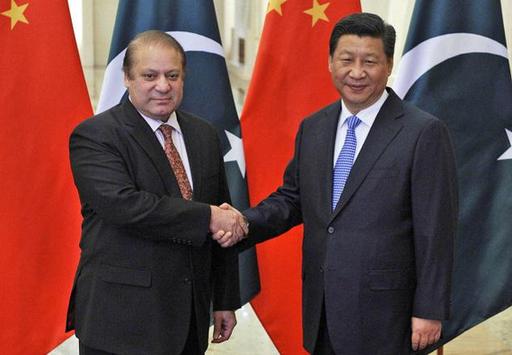Pakistan turns to China for economic resurrection
- By Sajjad Malik
 0 Comment(s)
0 Comment(s) Print
Print E-mail China.org.cn, November 15, 2014
E-mail China.org.cn, November 15, 2014
|
|
|
Pakistani Prime Minister Nawaz Sharif and Chinese President Xi Jinping pose for photos before their meeting at the Great Hall of the People in Beijing, China, on Nov. 8. |
Pakistan Prime Minister Nawaz Sharif was recently in China to attend the Asia-Pacific Economic Cooperation (APEC) meetings, although the high point of his visit was not the APEC conference but his meetings with President Xi Jinping and Premier Li Keqiang and about 20 major agreements and Memorandums of Understanding (MoUs) signed between the two sides. The exact value of the agreements was not given but Pakistan's Minister for Development Ahsan Iqabl, who accompanied Sharif during the trip, told the media that agreements worth US$46 billion were signed. They included US$35 billion in projects related to energy generation and US$11 billion in infrastructure development agreements.
It will take time before the agreements mature into investment but the mere assurance that Chinese money was in the pipeline eases pressure on Sharif and Pakistan. The Prime Minister narrowly survived an opposition push in August to dislodge him, while Pakistan's economy is standing at a decisive moment in its history. Pakistan should either transform into a normal country by putting emphasis on overall economic and social development, or continue its obsession with the security-centric narratives and downward slide. Sharif was indeed ecstatic after accords and said that the agreements with China would be a "game-changer" in the region.
There is no doubt that China has stood solidly with Pakistan throughout these turbulent years. Many Pakistanis have developed a sentimental streak in their liking for the Communist country which does not share much in culture or history with the Islamic Republic. The Chinese leaders genuinely want Pakistan to come out of poverty, political instability and threat of homegrown militancy. Unlike the Americans, they don't interfere in the country's internal matters and don't write prescriptions. They quietly urge Pakistan to learn from their experience of building economic ties by placing the political disputes onto the back-burner. China also thinks that Islamabad should deal with militant threats with an iron-hand. So far, Pakistan has shown little eagerness to learn from Beijing's experiences. Its leadership refused to improve economic ties with India until the Kashmir dispute is resolved and failed to crack down on militants in the Chinese style. Their reluctance irritates the Chinese and its latest manifestation was the cancellation of a scheduled trip of President Xi Jinping in September, who refused to land in Pakistan due to security reasons, as some opposition parties were protesting against the government.






